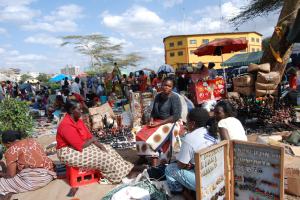I recently wrote my frustration with the conception of risk and vulnerability in the African continent as dealt with by a Davos World Economic Forum debate. There is a similar line in the ‘Africa Rising ’ discourse, which as the Davos debate, centered almost exclusively on growth, investment and interest in the continent’s economic future. What is missing from these conversations is a serious consideration of how growth is benefiting the citizens of each country, and how international development efforts and international capital should approach this evolution.
Part of the problem is a dissonance between aid/development actors and business and investment actors when it comes to developing economies on the continent. The discourse of shared growth, welfare, investment in local economies and the like are pillars of the broader aid/development discourse, and are put into practice through different programs and policy advising.
The business and investment end does not have the same angle of attack. To be sure there are differences between foreign direct investment and financial speculation, bank driven investment and the like. The nature of the investment and the timeframe considered for the investment are such that in the latter case, there is a smaller incentive to care about second-degree causes of success, such as a country’s education level. There is a tendency across the board to look at indicators such as the World Bank’s Ease of Doing Business, ‘hard’ infrastructure such as roads, electricity, internet, but also the ‘soft’ infrastructure indicators that are laws, regulations, corruption indices and the like.
This is why debates like Davos can come up, and this is why McKinsey and Co. keeps coming out with reports (relevant and useful though they may be) on how Africa’s rise is being driven by privatization, low inflation rates and other ‘strong fundamentals’. So, that the question of ‘whose benefit’ has not been featured as prominently as it should be in a certain (nebulous) sector’s articulation of ‘Africa Rising’ is certainly one glaring obstacle.
African Consumption
There is another very interesting line, running parallel to the previous one, but with a more African-centered focus: it’s the way in which Africa’s rise is equated with the rise of an African middle class and of an African consumer. (This is a real leit motif of whoever is in charge of African markets research over at McKinsey, because they are all over this one- and here, and here). The actual numbers are very interesting. Consumer product industries slated to grow by 400 billion dollars by 2020. Private consumption on the continent rose by 568 billion dollars from 2000 to 2010. All very exciting stuff.
It’s exciting because an African consumer of enough significance could really change the way foreign capital looks at African countries, in addition to deepening markets for African businesses. In pointing this out, these reports, op-eds and books play an important role in getting the message out- that is, we are long past the days when ‘development’ in African countries meant simple aid money. Okay, all well and good.
Upon Further Inspection…
But this discourse and these studies are still very detached from that of shared growth and social welfare. The business community, the investors who have African countries, companies, and projects in their portfolios aren’t as eager to talk social protection, insurance and welfare.
And yet there is a real need to do so. Not simply because there is a large vulnerable population on the continent, but because sometimes the very growth that is touted in all these statistics comes at the expense of the more vulnerable population. So yes, there is a rising African consumer. But when you look closer, you learn that 81% of African private consumption is concentrated in 10 countries- only 5 of which are in sub-Saharan Africa (and they are all pretty much the usual suspects). One more step and you learn that a vast majority of labor on the continent is informalized. Another step and you see that while Diaspora communities returning ‘home’ can bring some economic advantages, it also perpetuates existing social inequalities.
You can be satisfied with the quotation here below for only so long…
In the 1990s African economies embraced the World Bank and the International Monetary Fund’s (IMF) structural adjustment programmes, which advocated free market policies.“The introduction of liberalisation, which focused on private sector-led growth, is key to the growing middle class on the continent,” said Bategeka. “Countries introduced sound economic policies which controlled inflation, benefiting investments in their economies.” Source
…before you remember what structural adjustment also did to the African state’s ability to protect the most vulnerable in the 1980s and 1990s.
In the end…
There is nothing wrong with growth. But when you keep listening to Davos and to McKinsey and the others, it is easy to forget that growth and wealth in and of itself is not the end goal. Equatorial Guinea is classified by the World Bank as a High-Income country since 2007, even while 77% of the population lives on less than 2 dollars a day.
How can more of the population be involved in and see benefits from growth? How can growth serve to protect the most vulnerable from the risks of a globalizing domestic economy, from environmental changes, from health concerns? These are all questions of importance to the continent, and yes, to its overseas investors as well. This is the type of debate I would like to see grace center stage at forums like Davos.

